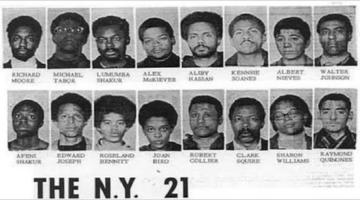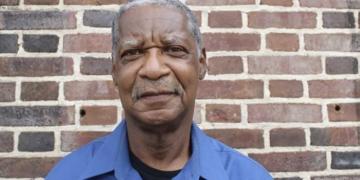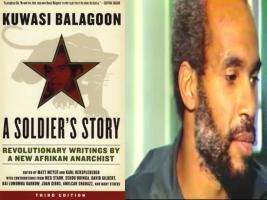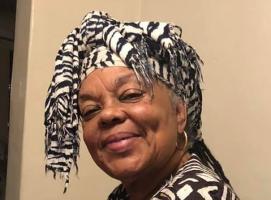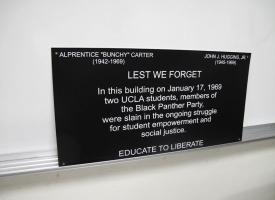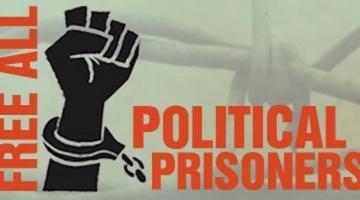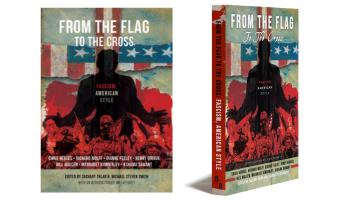The film framed Hampton as a victim instead of a pro-active freedom fighter and revolutionary.
“There is a brief reference to the BPP ten-point program, no mention of the BPP newspaper or the BPP service to the community beyond comments on the breakfast program.”
As a Black man, activist, educator, and multiple Emmy award-winning independent filmmaker, I'm compelled to document my impressions of the film Judas and the Black Messiah. Black people are under siege in every aspect of American society, and film has a role in documenting Black resilience.
Judas and the Black Messiah is another example of a trend in storytelling on display in films featuring Black historical characters. In some cases, stories are mingled with fiction to bring drama aimed at gaining white viewers' interest. In other stories, white saviors are validating the notion that Black survival demands white participation. Sometimes, stereotypical narratives including but not limited to Black people fighting each other, Black insecurity, or Black deviance foster concepts of Black weakness. This film takes a segment of a story focused on a lack of solidarity and keeps Black people trapped in the long saga of what might have been. An FBI informant infiltrates the Illinois Black Panther Party and keeps tabs on their charismatic leader, Fred Hampton.
Implicit in the storytelling are assumptions regarding what doesn't deserve recognition. In Judas and the Black Messiah, Black pride and solidarity are not worthy of consideration, reinforcing the over told narrative of Black men selling out another Black man and, in the process, compromising the promise of a movement. It is the story of another “Judas” locked under the control of powerful white people and his quest for a capitalist reward. Lost in this quest to tell Fred Hampton's story is the missed opportunity for a powerful statement -- the pride of the Black Panther Party (BPP) in a city in need of self-determination and a call for a new type of liberation. Judas and the Black Messiah is not a bad movie. It's a missed opportunity artistically and historically. “It is the story of another ‘Judas’ locked under the control of powerful white people and his quest for a capitalist reward.”
Telling the story through Judas' lens, the Bill O'Neil character, and therefore through his handlers' lens, was a missed opportunity. The film framed Hampton as a victim instead of a pro-active freedom fighter and revolutionary. Some have described the film as a biopic. The film was not Fred Hampton's story; it raised more questions than it answered about Hampton and the Black Panther Party. History and the ongoing oppression and exploitation of Black people and Black communities speak to the need to tell Fred Hampton's story from his perspective and the point of view of the BPP and the community they served.
Consequently, it was a missed opportunity to reveal who Fred Hampton was. How and why did he become "a revolutionary?" How did he become the leader of the Chicago chapter of the BPP? What was the relationship between the Chicago chapter and the national office in Oakland? There is a brief reference to the BPP ten-point program, no mention of the BPP newspaper or the BPP service to the community beyond comments on the breakfast program. The emphasis on guns and potential violence between Black men overwhelmed any sense of community building, self-determination, or protecting the community from racist police, oppression, and capitalist exploitation.
“The artist is a revolutionary figure. The serious artist grapples with his environment, passes judgment on it. He helps to deepen peoples' perceptions, quicken their thought processes. He makes them conscious of the possibility of historical change—and in that way, he facilitates change.”
Richard Wright, Interview with Charles Rolo (1945)
Artistically, the production design and lighting in Judas and the Black Messiah have missed opportunities. The characters' faces were constantly in the dark. It gave the film a dark tone and took away the emotion and complexity of facial expressions. In a sense, it deprived the characters of their visual humanity while also limiting the range of unspoken feelings they could express. Additionally, the dark visual pallet did not convey the pride, hopes, dreams, and optimism that the BPP instilled in communities nationwide. The darkly lit scenes of the Judas character, with his handlers, were appropriate and in concert with these insidious evil and morally bankrupt characters and their actions. However, artistically, the dark lighting of BPP scenes cast an air of doom when the BPP was actually about hope, change, and resilience. Music from the time was lacking, nearly non-existent, and a missed opportunity to connect the characters and the story to the times musically. The music of Curtis Mayfield, who was from Chicago, James Brown, and others, could have contributed to the film's emotional range.
“The dark lighting of BPP scenes cast an air of doom when the BPP was actually about hope, change, and resilience.”
These and other missed opportunities are relevant to understanding this history and for contemporary Black American activists. Unfortunately, there is a generation of young Black people who know the Black Panthers solely in the context of the fictional land of Wakanda, in the feature film Black Panther. Yet, Black Panther Party members such as Fred Hampton, Bobby Seale, Huey P. Newton, David Hilliard, Elaine Brown, and others fought for, and in too many instances, died for the values and images embraced and celebrated in the mythical land of Wakanda. Our history and culture are a treasure trove of genuine and authentic stories waiting to be told through the lens of Black self-determination instead of through traders' lens.
Too often, Hollywood demands, and Hollywood connected Black filmmakers accept the studios' vision, whose only motivation is to commodify and market our history and culture. Yet, telling our stories from Black points of view in an engaging manner that embraces our humanity and dignity can also be profitable. As Black people and consumers, we must demand more from Black filmmakers. It is not enough to see Black faces on the big screen. We need films that explore our resilience and our full humanity. We do not need more films produced for Hollywood capitalist exploitation of our history and culture.
“Not everything that is faced can be changed, but nothing can be changed until it is faced.”
James Baldwin
Consequently, we must support independent Black films free from the influence of Hollywood, market-driven films, and their scripting, aesthetics, and casting priorities. Fred Hampton, Black Panther Party members, and many other revolutionaries fought for Black and poor people's liberation. Now we must fight for better, more complex interpretations of our history and culture in Hollywood films. We must also create opportunities and financial structures to tell our own stories, from our point of view, and reap the economic benefit from our efforts. In closing, there is a film about Fred Hampton, executive produced by my mentor, Henry Hampton (1940-1998), in the PBS series Eyes on the Prize II.
Dante James
Emmy Award-Winning Independent Filmmaker
Black Pearl Media Works
Member DGA & WGAE
COMMENTS?
Please join the conversation on Black Agenda Report's Facebook page at http://facebook.com/blackagendareport
Or, you can comment by emailing us at comments@blackagendareport.com


